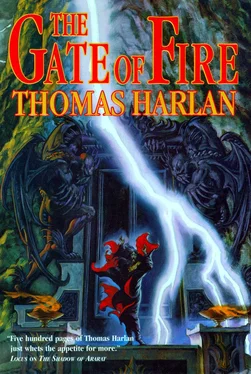Thomas Harlan - The Gate of fire
Здесь есть возможность читать онлайн «Thomas Harlan - The Gate of fire» весь текст электронной книги совершенно бесплатно (целиком полную версию без сокращений). В некоторых случаях можно слушать аудио, скачать через торрент в формате fb2 и присутствует краткое содержание. Жанр: Фэнтези, на английском языке. Описание произведения, (предисловие) а так же отзывы посетителей доступны на портале библиотеки ЛибКат.
- Название:The Gate of fire
- Автор:
- Жанр:
- Год:неизвестен
- ISBN:нет данных
- Рейтинг книги:4 / 5. Голосов: 1
-
Избранное:Добавить в избранное
- Отзывы:
-
Ваша оценка:
- 80
- 1
- 2
- 3
- 4
- 5
The Gate of fire: краткое содержание, описание и аннотация
Предлагаем к чтению аннотацию, описание, краткое содержание или предисловие (зависит от того, что написал сам автор книги «The Gate of fire»). Если вы не нашли необходимую информацию о книге — напишите в комментариях, мы постараемся отыскать её.
The Gate of fire — читать онлайн бесплатно полную книгу (весь текст) целиком
Ниже представлен текст книги, разбитый по страницам. Система сохранения места последней прочитанной страницы, позволяет с удобством читать онлайн бесплатно книгу «The Gate of fire», без необходимости каждый раз заново искать на чём Вы остановились. Поставьте закладку, и сможете в любой момент перейти на страницу, на которой закончили чтение.
Интервал:
Закладка:
"There is still a little time within which to learn, loyal Khadames. I had faith that you would understand and act. If you had not, well, there are others who strive to take your place… but I know you. You have not yet been tested to the breaking. Go, see to my people."
– |One of the three of the Sixteen had spoken when Khadames had looked up from his desk. "You are summoned below," the voice grated. "The master would have you look upon a thing."
Khadames was sure that nothing remained of the men who had climbed the road to the great door and the sign of fire. Some shell of humanity remained; limbs and sinew, hands and arms, but nothing else. Their voices were gone, replaced by a hollow echo. Black pits watched where eyes had once been. The Sixteen did not know fear, or hunger, or weariness. They came and went from the hidden valley and Damawand at the will of their master. The Uze crept aside when they passed, and cursed them silently to their backs. They rarely made a sound. Khadames knew they went about in the world beyond the mountains, carrying messages and undertaking unknown errands for the power that bided its time, here in the mountain.
When they spoke, which was seldom, men hurried to obey. Khadames stood up and carefully put away the most important papers in an iron box. Out of habit, he buckled his old worn saber to his side and shrugged on a light woolen jacket one of the women had given him. It was a faded blue with hunting dogs embroidered along the collar and cuffs in red and green and brown. Then he went out of his office, following the three, and they made their way down into the depths of the mountain. Broad ramps and winding stairs connected the levels, and as Khadames passed, he noted with satisfaction that the buried city hummed with life. Long hallways were filled with bunks and training rooms and men, thousands of men, bent to the tasks of war. Kitchens belched steam and the smell of porridge and roasting mutton. Lines of sweating laborers unloaded wagons and stacked barrels and crates and boxes in storerooms that had lain empty and unused for a thousand years.
Deeper, under the storerooms, they went down into darkness and the forges and armories of the mountain. The valley that lay below Damawand had been stripped of trees weeks ago; just the effort of building furniture for the buried city had consumed the groves of fruit trees and pines on the lower slopes. Now wagon trains of lumber and pig iron and wheat and cloth rumbled up the narrow valley road on a daily basis. Damawand had a huge appetite, but it vomited forth the sinews of war. Above, in his office, Khadames could count the muster of hundreds of thousands of arrows, hundreds of siege engines, thousands of swords, maces, spears, shields, suits of lamellar, and mail armor. Six great workshops, he knew, did nothing but build wagons and a clever Chin mechanism called a wheelbarrow.
Two tanneries worked around the clock, producing a stench that pervaded the second level and turned the valley stream into an odd-colored sewer. Another three were being built, slowed only by the necessity to bring the great tanning vats by mule up from the provincial capital of Rayy. The lack of lumber hampered many efforts. And below, in the deeper forges, where Dahak was wont to walk at night, other things were being built of iron and steel and gold.
– |The black onyx steps led down three long flights, and then Khadames felt the air change around him. A layer of mist shimmered in the stairway, where the fetid hot air of the forges ended and he passed into a realm of bitter cold. It was a shock, like plunging into an icy lake. He felt the sweat on his brow turn cold, and he shivered. The iron lanterns that marked the upper halls ceased, and he walked in darkness. But he did not pause, or halt, for one of the Sixteen walked before him and two behind.
The stairs ended, and a broad passage carried them onward.
Then the passage stopped at a door. It groaned open, and Khadames felt a breeze on his face. The door was stone, that much he could hear, and vastly heavy. It ground slowly across the floor until a thin slat of blue light appeared in the darkness, and then it widened into a doorway.
Beyond, in a room with a ceiling of mortised blocks and slender pillars, the sorcerer was waiting, leaning over a long slab of stone. The three of the Sixteen entered the room and laid, at last, their softly moving burdens down. Khadames entered, too, though a queasy feeling of terror threatened to crawl up his gut and strangle him. On the long table of stone a body lay, one that Khadames had looked upon before.
– |Men, women, even children came to the valley by secret ways. In his office, Khadames interviewed them and learned a little at a time of the ruin of Persia. Beyond the rampart of the mountains, beyond their high, snowcapped peaks, the empire of the sons of Sassan was dying. Rome had wounded it first; smashing the Imperial Army in the massive battle at Kerenos River, then driving a steel dagger into its brain by murdering Chrosoes, King of Kings, in his palace at Ctesiphon. But now, with the Emperor and his children dead, the jackals were tearing at the still-living body that remained. The wreck of Ctesiphon had staggered the entire Empire; central control was lost, and the delicate framework of guidance and taxation and aid that had radiated from it was thrown down. The provincial lords and governors, bereft of any guidance from the heart of the realm, had turned inward, trying to deal with their own local problems.
The winter rains had wounded the Empire again. A huge proportion of the able manpower of the Empire had died or been scattered to the four winds in the disaster at Kerenos. Then unseasonably heavy rains in the great flat valley of Tigris and Euphrates had overwhelmed the huge collection of dikes and dams and canals that controlled the two great rivers. Massive flooding had ensued, destroying the harvest and isolating large sections of the lowland Empire. The Romans, though they had claimed Persia for their own, even issuing a proclamation that the Prince Theodore of the Eastern Empire was now "Caesar of the East," had not stayed to repair the damage done by their campaign.
Now the fatal wound was brewing. Khadames could hear it in the voice of the latest men to come to the valley. Word had at last traveled the length and breadth of the Empire; from Amida in the west, to Susania in the east-the throne of the King of Kings was empty. Soon, pretenders would arise, and the last vestiges of central control would fail. Civil war would brew up and consume all that remained. Sitting in his office, in the pale shaft of sunlight, Khadames wondered if the sorcerer's ambition reached high enough.
Then he looked out across the valley, seeing thousands of men drilling with spear and bow and sword, seeing the long lines of wagons inching their way up the road to the great gate, seeing the gangs of slaves digging new tunnels and caverns into the mountains. Smoke and fumes rose above the valley, wreathing the mountaintops in dark clouds.
– |"Come, loyal Khadames. He is beautiful, is he not?"
The sorcerer gestured, and Khadames forced himself to approach. The body that lay on the slab was withered and turned a little on its side. The face, once handsome, was stretched tight on the skull. The puckered lips of terrible wounds mocked the general, and he could not bring himself to look fully upon it.
"Ah now," the sorcerer said, "he will improve. These men who serve me so well, these Shanzdah"-a pale hand with dark nails gestured lazily to the three of the Sixteen who stood in the shadow-"they will do something about the parched nature that he currently exhibits." The hand laid gently on the wrinkled brow of the mummy, then trailed away.
"But there is other work to be done. Look at me, loyal General."
Читать дальшеИнтервал:
Закладка:
Похожие книги на «The Gate of fire»
Представляем Вашему вниманию похожие книги на «The Gate of fire» списком для выбора. Мы отобрали схожую по названию и смыслу литературу в надежде предоставить читателям больше вариантов отыскать новые, интересные, ещё непрочитанные произведения.
Обсуждение, отзывы о книге «The Gate of fire» и просто собственные мнения читателей. Оставьте ваши комментарии, напишите, что Вы думаете о произведении, его смысле или главных героях. Укажите что конкретно понравилось, а что нет, и почему Вы так считаете.











